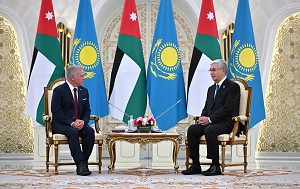Can more efficient economic management turn Jordan’s challenges into opportunities for growth? - By Hamad Kasasbeh, Jordan News
It is unreasonable for a country like Jordan, with its strategic location and its human and natural resources, to struggle to achieve sustainable growth. Yet decades of structural challenges have left the economy fragile: rising public debt, declining investments, high unemployment, and persistent gaps in labour markets, productivity, and the trade balance. These chronic imbalances highlight the urgent need for more efficient economic management that can reset priorities and direct resources toward real development.
Jordan also operates in a volatile regional environment that has weighed heavily on its economy and security. Prolonged regional conflicts and the inflow of large numbers of refugees have placed additional pressures on already limited resources. Yet other countries facing similar conditions managed to turn them into opportunities for growth. This suggests that Jordan’s challenges are not only external but also linked to the effectiveness of domestic management.
Despite these pressures, Jordan is not without alternatives. The country has opportunities if it invests wisely in its human capital, renewable resources, and production capacity. Reducing reliance on costly imports, which drain billions of dollars every year, can save foreign currency and protect jobs. But this requires smart industrial and trade policies that strengthen local production in industry, agriculture, and technology.
Global experience shows that limited resources are not an obstacle to development. On the contrary, they can drive innovation when governance and long-term strategy are in place. This is exactly what Jordan needs: to move toward a system led by transparency, efficiency, and strategic planning.
The private sector remains central to this equation. Yet its current performance falls short of national ambitions. Traditional business structures continue to limit growth and innovation. Reform is needed through flexible regulations, incentives linked to productivity, and the gradual integration of the informal economy into the formal system to expand the tax base and improve fairness. At the same time, investment in education and digital skills is critical for improving productivity and driving digital transformation.
Mining is another key pillar. Jordan holds significant reserves of phosphates, potash, and rare minerals. Yet exporting them as raw materials reduces their economic value. Expanding into downstream industries would increase revenue, diversify exports, and create skilled jobs. Foreign direct investment can support this by bringing technology and opening new markets.
The green economy is also a strategic pathway. Transitioning to renewable energy and managing resources efficiently can cut costs, open new markets, and create environmentally friendly jobs. This makes development more sustainable in the long run.
Large-scale projects like the National Water Carrier and the development of a railway network connected to ports can strengthen infrastructure and enhance Jordan’s regional role in trade, energy, and logistics. However, the success of these projects depends on stronger monitoring and follow-up systems to ensure proper execution and to avoid past mistakes.
Bureaucracy and weak follow-up remain serious obstacles. Poor coordination between institutions, complex procedures, and slow decision-making continue to reduce the effectiveness of economic programs. Tackling this administrative challenge is essential for building trust and ensuring that economic reforms deliver results on the ground.
Regional development also remains a weak point. The capital still attracts most investments while the provinces suffer from gaps in infrastructure and services. Bridging this divide requires targeted investments and empowering local councils to play a real role in policymaking, ensuring fairer distribution of growth.
Tourism is another vital sector, contributing around 15% of GDP in recent years. Expanding tourism infrastructure, improving services, and investing in digital promotion can multiply revenues and make tourism a stronger driver of growth. The same applies to agriculture, food, and water security, where modern techniques, desalination, and solar energy can reduce reliance on imports and provide sustainable solutions.
Public debt is not necessarily a problem if economic growth exceeds the pace of debt growth. Yet when debt servicing exceeds the economy’s capacity, it becomes a heavy burden. Innovative tools, such as debt-for-development swaps, combined with reallocation of spending toward productive sectors and closer coordination of fiscal and monetary policies, can ease financial pressures and support stability.
In the end, Jordan’s economic challenge lies less in scarce resources and more in how they are managed. With efficient management, challenges can be transformed into opportunities for growth, provided there is strong political will and sound governance. These facts are not unknown to those preparing Jordan’s executive programmes for modernisation. The real challenge lies in implementation and continuity. And as His Majesty the King has stressed, turning challenges into opportunities remains the fastest and most sustainable path toward recovery and long-term growth.




